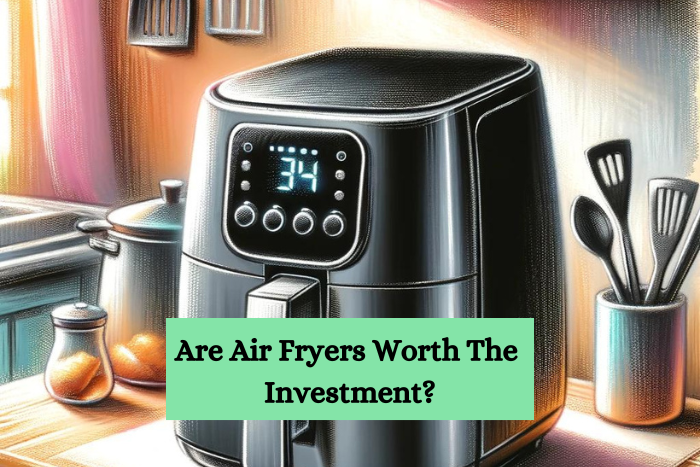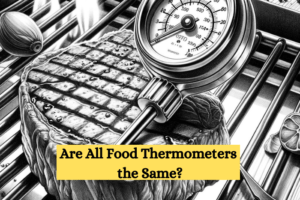Air fryers use hot air circulation to cook food, offering a healthier alternative to deep frying with minimal oil use. They provide faster cooking times, versatility in meal preparation, and easier cleanup. While the initial cost may be high, the energy efficiency and health benefits justify the investment.
I’ve noticed a growing trend — air fryers popping up in kitchens everywhere. Friends rave about them, and ads claim they’re a healthier way to enjoy fried favorites.
As someone curious about kitchen gadgets and keen on making informed decisions, I decided to investigate. Are air fryers a fleeting fad or do they deserve a permanent spot on your counter?
Here’s a breakdown of what’s fueled their popularity. First, understand the basics: Air fryers cook by circulating hot air around the food, producing a crispy layer via the Maillard reaction — that’s foodie speak for what gives fried foods their delightful crunch.
Unlike deep fryers, they require little to no oil. Air fryers also boast quicker cooking times compared to conventional ovens.
In comparison to traditional cooking methods, such as deep frying, roasting, or sautéing, air frying stands out for its health benefits and convenience. Deep frying soaks your foods in oil, adding significant calories and potentially harmful compounds.
📊 Air Fryer Statistics: The Ultimate Cooking Gadget 🌟 |
||
|---|---|---|
| Category | Statistic | Detail |
| Health Benefits | 75% Less Fat | Compared to traditional frying methods 🥗 |
| Cooking Speed | 30% Faster | Compared to conventional ovens ⏱️ |
| Versatility | 70% of Users | Cook a variety of meals regularly 🍗🥦🍪 |
| Energy Efficiency | 25% Savings | Reduction in electricity bills ⚡ |
| Ease of Use | 95% Satisfaction | Users find air fryers easy to use and clean 🧼 |
| User Satisfaction | 92% Recommend | Would recommend to others 👍 |
| Cost Efficiency | 80% Positive | Users believe benefits outweigh costs 💵 |
| Brought to You by athomewithtai.com 🌐 | ||
Air fryers achieve similar taste and texture without swimming in grease. Here’s where it gets interesting.
The variety of dishes you can whip up with an air fryer might surprise you. Beyond fries and chicken nuggets, adventurous cooks use them for everything from Brussels sprouts to salmon.
And it’s not just about frying — you can bake, roast, and even grill. Now, let’s talk about the convenience factor.
Air fryers heat up incredibly fast and usually cook food faster than ovens. For busy individuals, this translates to less waiting and more enjoyment.
Plus, cleanup is typically easier since you’re dealing with less oil and more parts are dishwasher safe. All this sounds promising, but before you sprint to the store, let’s get down to brass tacks.
What’s the cost of adding this trendy appliance to your culinary lineup? And what are the real savings when you factor in energy efficiency and health benefits?
Hold that thought — we’ll explore that in the next section.
The True Cost of Air Frying: Balancing Benefits with Investment

After exploring the trend and understanding how air fryers operate, it’s clear they bring a unique set of advantages to the table. But now, I weigh these perks against the investment to answer if they truly deserve a spot in your kitchen.
When you first consider buying an air fryer, the price tag might make you hesitate. The upfront cost of a high-quality appliance often ranges from moderate to high.
However, you must think of this as an investment in quicker meal prep, energy efficiency, and a potential positive shift in your eating habits. Speaking of savings, don’t overlook the long-term benefits.
Air fryers are celebrated for their energy-efficient nature as compared to conventional ovens. They heat up faster and retain heat better, which can cut down your electricity bills over time.
Moreover, if you’re a fan of fried foods, the reduced oil use not only supports a healthier lifestyle but also saves money usually spent on cooking oil. From a health viewpoint, air frying can be a game changer.

Cooking with minimal oil means intake of fewer calories and less fat. This method of cooking can contribute to a balanced diet and might just be the nudge you need towards a healthier you.
Practicality is also crucial. Air fryers are relatively compact, making them perfect for small apartments or for those who don’t enjoy clutter.
Their ease of use earns points too—simple controls and quick clean-up are a busy person’s dream. Still, durability and maintenance are important to consider.
Most quality air fryers are built to last, often outliving similar kitchen gadgets. Their parts are generally dishwasher-safe, making the after-dinner tidy-up less of a chore.
Lastly, consider the satisfaction of current air fryer owners. Online reviews and testimonials tell tales of transformed cooking experiences and a newfound enthusiasm for home-cooked meals.
My Final Thoughts
- Healthier Cooking: Air fryers use little to no oil, making them a healthier choice for cooking fried foods.
- Faster Meal Prep: Air fryers heat up quickly and cook food faster than conventional ovens.
- Versatility: Beyond frying, air fryers can bake, roast, and grill.
- Energy Efficiency: Air fryers are more energy-efficient than traditional ovens, which can lead to lower electricity bills.
- Easy Cleanup: With fewer oil splatters and dishwasher-safe parts, cleaning up after cooking becomes much simpler.
Air fryers can be a wise investment. While they might not replace traditional cooking methods altogether, they offer significant convenience, health benefits, and savings—both in time and cost.
If these factors align with your lifestyle and cooking preferences, then it’s a resounding YES—an air fryer could very well be worth your investment. How do you think incorporating an air fryer into your kitchen would impact your daily cooking habits and overall approach to healthy eating?
Let me know in the comments below!
FAQ

1. Are air fryers healthier than traditional frying methods?
Yes, air fryers use significantly less oil, which reduces the fat and calorie content of foods compared to deep frying.
Additionally, air fryers avoid the harmful compounds that can form when oil is heated to high temperatures in deep frying.
2. What can you cook in an air fryer?
You can cook a variety of foods including fries, chicken wings, vegetables, and even baked goods like cookies.
Some users also experiment with roasting meats and grilling fish, making it a versatile kitchen appliance.
3. Do air fryers save time in cooking?
Air fryers typically cook food faster than conventional ovens because they heat up quickly and circulate hot air efficiently.
This can be particularly beneficial for busy weeknight dinners, reducing overall meal prep and cooking time.
4. Are air fryers easy to clean?
Most air fryers have dishwasher-safe removable parts, making cleanup quick and easy.
Additionally, because they use less oil, there is usually less greasy residue to deal with compared to traditional frying.
5. Are air fryers worth the investment?
Many users find that the health benefits, convenience, and energy efficiency of air fryers justify the initial cost.
Moreover, the versatility of air fryers in cooking a wide range of dishes adds value to the investment, making it a worthwhile addition to many kitchens.
- Air Fryers: The Healthy, Quick, and Easy Cooking Solution
- Are All Food Thermometers the Same?
- What Is an Immersion Blender and Do You Really Need One?
- Do You Need a Dutch Oven? Here Are Four Reasons That You Do!
- Six Key Factors To Consider When Buying Cookware
- Why Use a Cast Iron Skillet?

I’m Diane, a culinary enthusiast who loves to share my cooking adventures and knowledge with you.
This blog is my cozy corner on the internet where I unravel the secrets behind making everyday cooking simple, enjoyable, and downright delicious.
Whether it’s unlocking the flavor potential in chicken or figuring out why your mashed potato cakes won’t hold together, I’m here to guide you through.
Join me as we explore various dishes, solve common kitchen dilemmas, and discover new recipes that will make you fall in love with cooking all over again.
Cooking is an adventure that’s best shared, so let’s get started!







